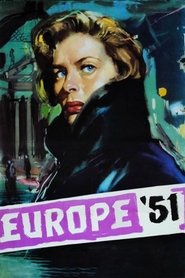An interesting piece of Italian neorealism, especially in that, unlike Umberto D. (1952) and Bicycle Thieves (1948), its story of postwar working-class life in Rome is seen primarily through a bourgeois lens. This seems to trade off legibility (from the perspective of a mainstream Anglo-American audience) against a slight feeling of de haut en bas, and, dare I say it, the emotional impact of Vittorio De Sica's films. Although it is almost fatally compromised by poor ADR, weak supporting acting and slightly heavy didacticism in the final act, Europe '51 leaves it slightly ambiguous whether Irene is institutionalised primarily due to her rejecting her class origins or due to her 'discovery' of socialism. No doubt Rossellini would say it was both, that these things were deliberately in tension, or would emphasise the film's Christianity/Saint Francis overtones. In this sense, I am quite taken by Fred Camper's phrasing that "Rossellini’s images are never pictures but windows onto something larger, and their function in the film often shifts, with one kind of image subtly critiquing another." Indeed, Camper's analysis in Criterion is particularly good on the instrumental use of the camera. For example:
“I’ve been imagining the most terrible things,” Irene’s mother says to George in her absence—and then we cut not to an image of Irene in trouble but to the prostitute receiving the last rites. By deflecting our attention to the woman truly in need, and in an abrupt cut rather than a dissolve, Rossellini reminds us that Irene has abandoned a world in which the sympathies of the wealthy are only for each other.
I also like Richard Brody's overview of "Roberto Rossellini's four great melodramas", which are:
… proof, if any were needed, that the categories of naturalism and realism, story-telling and melodrama, are hardly worth mentioning apart from the director’s specific imaginative universe.
David Thomson also writes about the relationship between Ingrid Bergman and Roberto Rossellini, claiming that their films are:
… a landmark in the ongoing soap opera in which a man uses film to show what he feels for a glorious woman: it is of the same family as D. W. Griffith and Lillian Gish, Josef von Sternberg and Marlene Dietrich, Jean-Luc Godard and Anna Karina, Michelangelo Antonioni and Monica Vitti, and so on.
Synopsis: A wealthy, self-absorbed Rome socialite is racked by guilt over the death of her young son. As a way of dealing with her grief and finding meaning in her life, she decides to devote her time and money to the city’s poor and sick. Her newfound, single-minded activism leads to conflicts with her husband and questions about her sanity.

